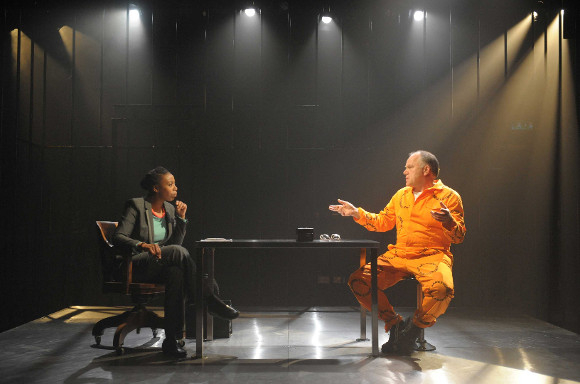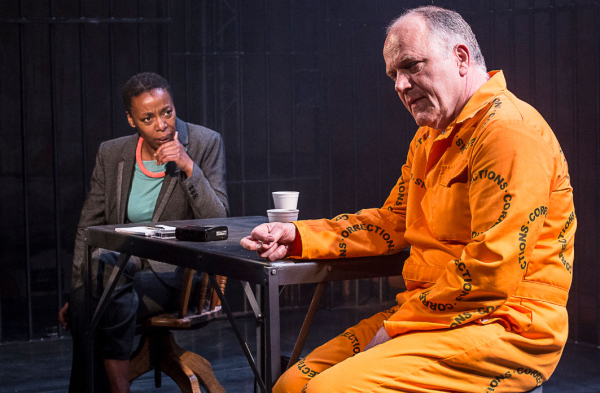A Human Being Died That Night (Hampstead Theatre)

It begins in the foyer. We are assembled for a lecture. We are to hear South African psychologist, and member of the Truth and Reconciliation Commission, Pumla Gobodo-Madikizela, speak about the possibility of forgiveness for crimes against humanity under the apartheid regime. The subject of her talk is the notorious Eugene de Kock, a former police commander and counter-insurgent murderer and torturer known as ‘Prime Evil’.
She describes going to visit him in jail in Pretoria, where he is serving two life sentences plus another 212 years. We move with her into the viewing room outside his cell. He is waiting for us there, his legs in chains and dressed in the latest bright orange prison garb. For the next 75 minutes we are eye-witnesses as Pumla, played with forthright charm, dignity and courage by Noma Dumezweni, prompts de Kock with questions, trying to discover the personality behind the state-licensed ‘monster’.
It is not an easy 75 minutes. We see this chained bull of a man reciting his grievances, rehearsing his speeches to the Commission, and displaying the raw emotion of a nerveless killer who finally cracked under the strain of looking his victims in the eye as they died. Matthew Marsh gives a huge rollercoaster of a performance as de Kock, and has the audience mesmerised by his every punishingly authentic word and gesture.
He jokes about his being in a cell with Pumla as reminiscent of the film The Silence of the Lambs and sees himself portrayed as another Hannibal Lecter. He is so incensed by the easy caricature created by the press that he is determined to explain himself, perhaps to expiate his wrongdoing, and even, finally, to seek forgiveness and release from prison.
But can such atrocities ever be forgiven? Can we ever truly understand such people, or see them as fellow human beings deserving of our empathy? Pumla is persuasive in this regard, but the only real conclusions drawn by the play are that the difference between good and evil "is only paper thin" and how little people can truly know of each other. Perhaps these are the only conclusions that can be drawn.
Nicholas Wright, who confesses in the programme notes, to "always being on the lookout for books about his country’s past", has fashioned something timeless from the original book by Pumla Gobodo-Madikizela. Anything on the theme of apartheid has inherent drama of a high-octane variety, and in Wright’s hands, and those of his director Jonathan Munby, it is given a concise, succinct and gripping examination. A five-star piece of theatre.











